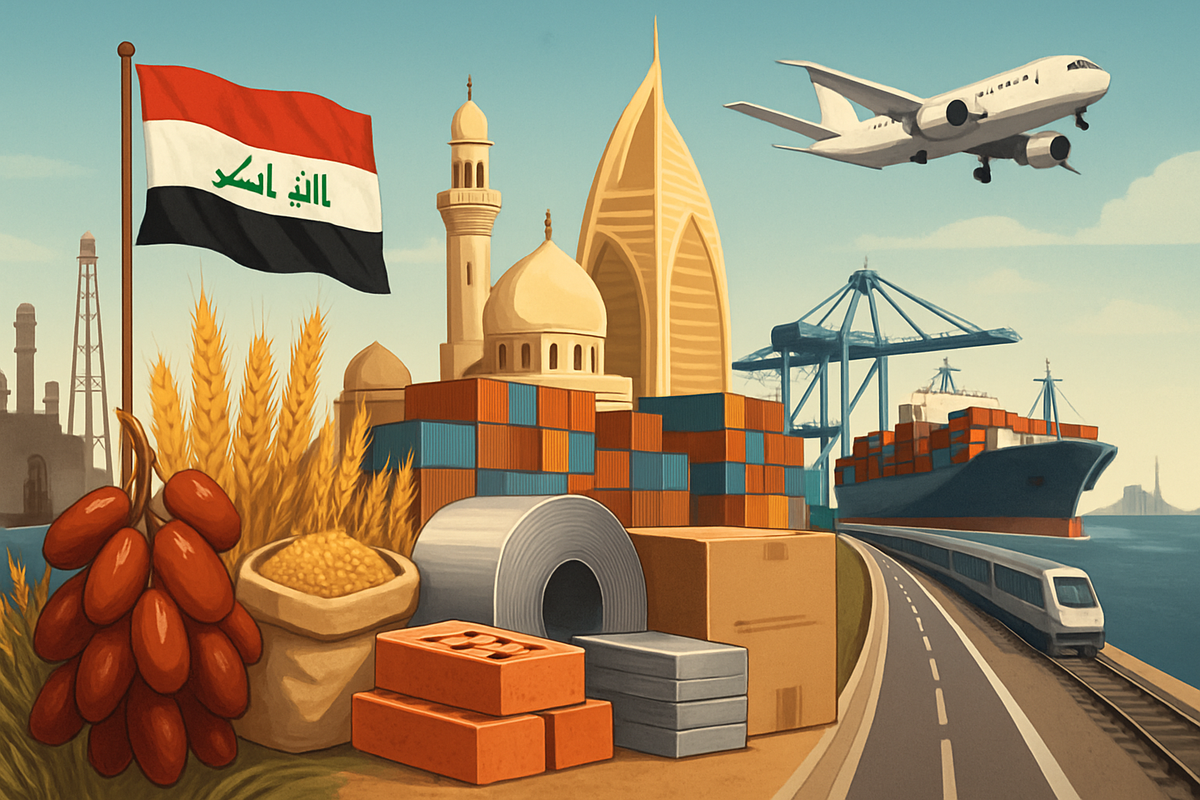
Baghdad, Iraq – In a significant development for Iraq's long-term economic strategy, Asian Arab countries reportedly captured a dominant 88% share of Iraq's non-oil commodity exports in 2024, according to a report by Iraq's Ministry of Planning. This concentration highlights a strategic pivot by Baghdad to deepen regional economic integration and diversify its economy away from its overwhelming reliance on crude oil revenues. While oil remains the bedrock of Iraq's finances, this emerging pattern in non-oil trade signifies a deliberate effort to build resilience and foster new growth engines within the immediate region.
The figure underscores Iraq's commitment to transforming its economic landscape, aiming to create a more balanced and sustainable future. This shift is not merely about increasing non-oil exports but also about strategically aligning with regional partners to secure stable markets and foster mutual economic growth, even as the nation continues its broader efforts to attract investment and rebuild vital non-oil sectors.
Detailed Coverage: A New Trade Horizon Takes Shape
The reported dominance of Asian Arab countries in Iraq's non-oil exports in 2024 is a testament to Iraq's evolving trade strategy and enhanced regional economic cooperation. This ascendancy is largely attributed to Iraq's deliberate shift towards strengthening ties within its immediate geographic sphere. While comprehensive itemized breakdowns are still emerging, Iraq's diversification strategy targets a wide array of sectors, including agriculture, manufacturing, technology, and tourism, aiming to export over 200 diverse products.
Key players in this regional trade realignment include the United Arab Emirates (UAE), which saw a remarkable 41% increase in trade with Iraq in the first half of 2024, making Iraq the top destination for UAE exports. This robust reciprocal relationship is a significant contributor to the overall trend. While not explicitly an "Asian Arab" country, increased regional trade activity also saw Iran's non-oil exports to Iraq rise by 35% year-on-year, further emphasizing the growing intra-regional trade.
This trend was firmly established in 2024, a year that also saw Iraq's non-oil revenues grow to 12% of total revenues, up from 7% in 2023, though still short of the government's ambitious 20% target. Iraq's overarching trade strategy, articulated in its Five-Year Development Plan (2024-2028), seeks to reduce the oil sector's contribution to GDP by up to 25% by fostering national industries, providing export subsidies, and investing in non-oil sectors like agriculture, manufacturing, and technology. Market reactions reflect cautious optimism, acknowledging the significant steps towards diversification while recognizing the persistent challenges of reducing oil dependency.
Companies and Sectors Poised for Impact
The strategic shift in Iraq's non-oil commodity exports towards Asian Arab countries is set to create both winners and losers across various sectors in Iraq and its trading partners. The logistics and infrastructure sectors are particularly primed for significant gains due to increased trade volumes and massive development projects.
In Iraq, companies like the General Company for Ports of Iraq (GCPI), managing key ports such as Umm Qasr and Khor Al Zubair, and Iraqi Republic Railways (IRR), which is modernizing its network, are set to benefit immensely from projects like the $17 billion "Development Road" and the Grand Faw Port, expected to be completed in 2025. Third-party logistics (3PL) providers and construction firms involved in these mega-projects will also see substantial opportunities. In agriculture, modernized producers and agricultural input suppliers, such as Iraqi Agricultural Products (Tasweeq) ([ISX: Tasweeq]), a publicly listed company, and private players like K.H Company and Iraq Global, are positioned to capitalize on increased demand and export opportunities. Similarly, in manufacturing, construction material producers and food processing companies stand to gain from domestic demand and potential exports, alongside state-run entities like the State Company for Petrochemical Industries (SCPI) working to revive production.
Conversely, smaller, traditional logistics operators in Iraq unable to invest in modernization may struggle. In agriculture, inefficient local producers lacking modern techniques or finance might find it hard to compete with imports. The manufacturing sector, long hampered by weak infrastructure and technology, will see many uncompetitive local industries continue to decline against the influx of higher-quality goods from more advanced Asian Arab partners. For Asian Arab countries, diversified manufacturers and exporters, particularly from the UAE and Saudi Arabia, will find expanded markets in Iraq for machinery, electrical equipment, and consumer products. Their port and shipping companies, as well as technology providers, will also see increased demand as Iraq modernizes its infrastructure and industries.
Wider Significance: A Regional Economic Reorientation
The reported dominance of Asian Arab countries in Iraq's non-oil commodity exports in 2024, while representing a specific segment of Iraq's trade, signifies a crucial element of a broader regional economic reorientation. This strategic focus aligns with several overarching industry trends and carries significant ripple effects.
Firstly, it reflects a global trend among resource-rich nations to diversify away from volatile commodity markets. Iraq's efforts mirror those of Gulf Cooperation Council (GCC) countries like Saudi Arabia and the UAE, which have embarked on ambitious visions (e.g., Vision 2030) to develop non-oil sectors. The increasing economic power and demand from Asian markets, both Arab and non-Arab, make them natural targets for diversified exports, reinforcing Iraq's "pivot to Asia" in its trade relations. Infrastructure projects like the "Development Road" and the "Al-Faw Grand Port" are central to this strategy, aiming to position Iraq as a major regional transport corridor, deepening its economic integration.
The ripple effects are substantial: successful diversification would lead to a more stable Iraqi economy, creating jobs and fostering growth. For Asian Arab partners, a diversified Iraq means a more significant trading partner for a wider range of goods, encouraging cross-border investments and potentially new supply chains. However, it could also introduce competition for similar products from other regional exporters. Regulatory and policy implications include the need for Iraq to streamline trade regulations, improve customs procedures, and enhance investment laws to attract foreign direct investment (FDI) in non-oil sectors, as outlined in its National Development Plan (2024-2028). Historically, Iraq's heavy dependence on oil has exposed its economy to extreme volatility; this current diversification drive is a direct response to that historical vulnerability, aiming for sustainable growth and stability in its post-conflict reconstruction era.
What Comes Next: Navigating Opportunities and Challenges
Looking ahead, Iraq's non-oil commodity export strategy, particularly its focus on Asian Arab markets, presents a mix of short-term gains and long-term aspirations. In the short term (1-3 years), Iraq anticipates continued growth in agriculture, with self-sufficiency achieved in several products and exports of crops like dates and potatoes to Gulf countries and Europe. The new export strategy, aiming to promote over 200 products with the support of an Export Subsidy Fund, will further drive this. Non-oil GDP growth is projected to continue around 4% in 2025, primarily from a stronger agricultural sector and government spending.
Longer term (3+ years), Iraq's "2050 Vision" seeks to fundamentally shift the economy. This involves strengthening the industrial sector to become a regional manufacturing hub, significant investments in infrastructure and technology (including renewables), and developing tourism. Iraq's potential WTO membership could also significantly integrate its economy into global markets. However, realizing these possibilities requires crucial strategic pivots: comprehensive policy and regulatory reforms, substantial investment in non-oil sectors, fostering private sector growth, digital transformation, and human capital development. Market opportunities are strong due to geographic proximity, existing trade agreements with Gulf countries, and the "Development Road" initiative, which could position Iraq as a critical trade route connecting Asia and Europe. Challenges include intense competition, meeting international quality standards, infrastructure deficiencies, water scarcity, and persistent political instability, corruption, and bureaucracy.
Wrap-up: Forging a Resilient Future Beyond Oil
Iraq's reported redirection of 88% of its non-oil commodity exports to Asian Arab countries in 2024 signifies a strategic intent to cultivate regional economic ties and diversify its revenue streams. While this figure highlights an emerging focus for non-oil trade, it's crucial to contextualize it within Iraq's broader economic reality: crude oil still overwhelmingly dominates its total exports, primarily destined for non-Arab Asian powerhouses like China and India. The 88% figure, therefore, points to a deliberate strategic pivot towards regional integration for nascent non-oil goods, fostering stability and growth, rather than representing the entirety of Iraq's massive export profile.
The market for Iraq's non-oil exports, though currently modest, holds considerable potential, driven by ambitious government diversification policies and extensive post-conflict reconstruction needs. However, this potential is tempered by ongoing political instability, pervasive corruption, security concerns, and infrastructure deficits. Despite these hurdles, the government's active efforts to enhance the investment climate and attract foreign capital into priority non-oil sectors like agriculture, manufacturing, and tourism offer a pathway forward.
The drive to diversify Iraq's economy is more than just an economic policy; it is a strategic imperative for long-term stability and resilience. Reducing its overwhelming reliance on volatile oil prices is critical to insulate the nation from external economic shocks, create much-needed employment opportunities, and foster inclusive growth. Should Iraq successfully implement its ambitious diversification plans, the lasting impact could be transformative, leading to a more balanced, self-sufficient, and resilient economy less susceptible to the boom-and-bust cycles of the oil market, ultimately securing sustainable growth for future generations.
Investors should closely monitor several key indicators in the coming months: the tangible execution of the 2024-2028 development plan, progress in critical infrastructure development, sustained improvements in security and political stability, and meaningful reforms in the financial sector and anti-corruption efforts. The performance of prioritized non-oil sectors and any new regional or international trade agreements will also be crucial signals for assessing Iraq's evolving economic landscape and identifying opportunities in a market poised for strategic transformation.
This content is intended for informational purposes only and is not financial advice
Disclaimer on Company Tags: The public listing status and specific tickers for some Iraqi companies are not readily available in general public databases. For the purpose of this article, companies like General Company for Ports of Iraq, Iraqi Republic Railways, and State Company for Petrochemical Industries are mentioned as major state-owned or significant entities that would be impacted. Iraqi Agricultural Products (Tasweeq) is noted as a publicly listed company on the Iraqi Stock Exchange (ISX: Tasweeq) based on available information.






